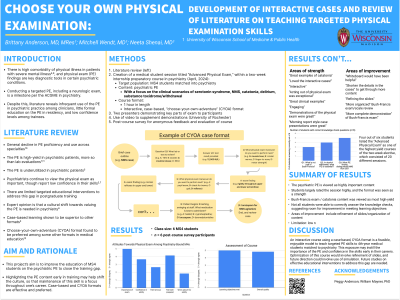Training, Education, Mentorship, and Career Development
(194) Choose Your Own Physical Examination: An Interactive Case and Review of Literature on Teaching Targeted Physical Examination Skills


Brittany Anderson, MD, MRes
Resident Physician
University of Wisconsin School of Medicine and Public Health
Madison, Wisconsin
Mitchell J. Wendt, MD
Psychiatry Resident
University of Wisconsin
Madison, Wisconsin- NS
Neeta Shenai, MD
Associate Professor of Psychiatry
University of Wisconsin School of Medicine and Public Health
Madison, Wisconsin
Presenting Author(s)
Co-Author(s)
Background:
There is a high comorbidity of physical illness in patients with severe mental illness (SMI) highlighting the importance of psychiatrists maintaining a skillset in physical examination (PE). Recent studies found that although most psychiatrists view the PE as important, most reported low self-perceived confidence and competence (Medina et al, 2019; Baillon et al, 2020). Conducting a targeted PE, including a neurological examination, is a milestone per the Accreditation of Graduate Medical Education (ACGME) in Psychiatry. Despite this milestone, there are limited targeted educational interventions to address this gap in postgraduate training.
Methods:
We reviewed the literature on the available curriculum on increasing competency of PE skills in Psychiatry. We created two interactive cases for an hour-long session that highlight key PE findings for fourth year medical students who have matched into Psychiatry as part of an internship preparatory course. Using an innovative format modeling the “Choose Your Own Adventure” game, students will engage in clinical decision making to discern PE findings of serotonin syndrome, neuroleptic malignant syndrome, substance intoxication and withdrawal, delirium, and catatonia for each case. Instructors (first two authors) will demonstrate key PE findings and cases will be supplemented with videos when challenging to exhibit. IRB approval was not required.
Results:
We will present a brief review of literature on available education initiatives to teach PE skills in psychiatry and the two cases we developed. In addition, we will present student evaluation data from course implementation in April 2024 through a post survey which will include overall quality of the session, student confidence in utilizing PE skills in clinical decision making, student perception of importance of skills, objective data on knowledge acquisition, and narrative feedback on areas of strength and growth.
Discussion:
Targeted curriculum in Psychiatry to increase competency and confidence in PE is needed. While standardized patients and high-fidelity mannequin-based simulation are useful tools to teach PE skills, there are financial limitations to utilizing these methods. Direct observation of skills by faculty is ideal but often challenging given increasing time constraints and variability in faculty comfort level of teaching targeted PE skills. Highlighting the importance of this content for medical students who have matched in Psychiatry may help shift the culture of the field, so that maintenance of this skill is a focus throughout their careers.
Conclusion:
An interactive case using an innovative “Choose Your Own Adventure” game format to emphasize clinical decision making is a feasible education model to teach targeted PE skills to fourth year medical students. Future studies on effective educational interventions to address this gap are needed to promote whole health.
References:
Medina M, Garza DM, Cooper JJ. Physical Examination Skills Among Chief Residents in Psychiatry: Practices, Attitudes, and Self-Perceived Knowledge. Acad Psychiatry. 2020 Feb;44(1):68-72. doi: 10.1007/s40596-019-01124-9. Epub 2019 Oct 28. PMID: 31659714.
Baillon S, Murray J. A national survey of psychiatrists' attitudes towards the physical examination. J Ment Health. 2020 Oct;29(5):558-564. doi: 10.1080/09638237.2018.1521938. Epub 2019 Jan 11. PMID: 30632831.
Presentation Eligibility: Not previously published or presented
Diversity, Equity, and Inclusion: The presenting author is a trainee. The topic includes a review of literature on teaching physical examination skills, which is important given the stigma of psychiatric patients in the medical setting, which impacts more heavily marginalized people.

